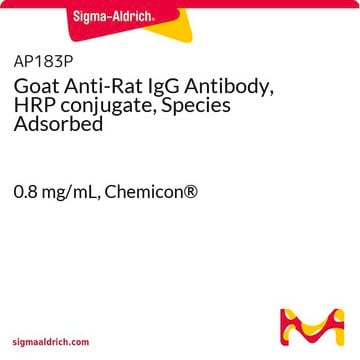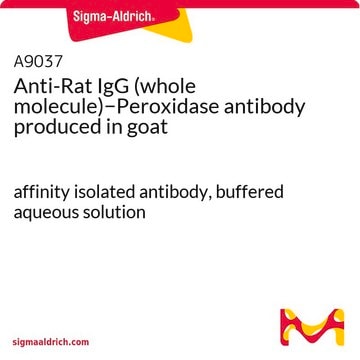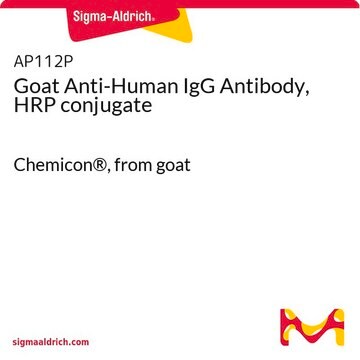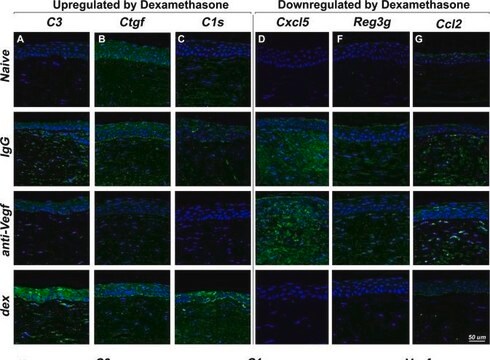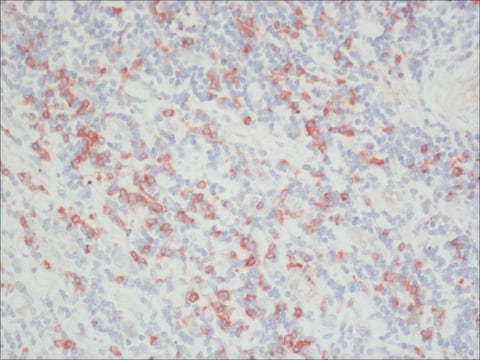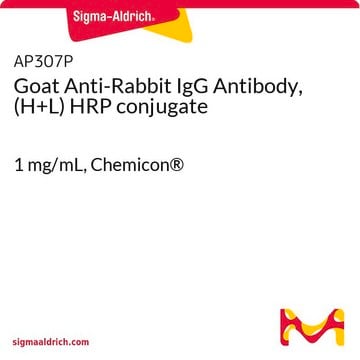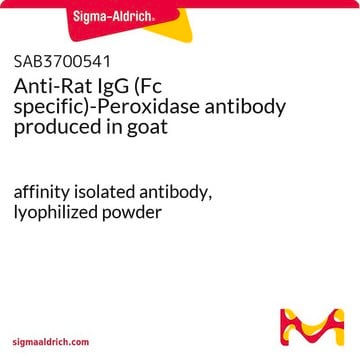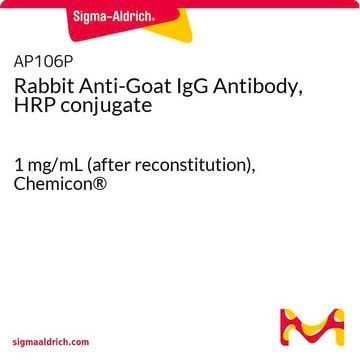AP136P
Goat Anti-Rat IgG Antibody, HRP conjugate
Chemicon®, from goat
Sign Into View Organizational & Contract Pricing
All Photos(1)
About This Item
UNSPSC Code:
12352203
eCl@ss:
32160702
NACRES:
NA.46
Recommended Products
biological source
goat
Quality Level
conjugate
peroxidase conjugate
antibody form
affinity isolated antibody
antibody product type
secondary antibodies
clone
polyclonal
species reactivity
rat
manufacturer/tradename
Chemicon®
technique(s)
ELISA: suitable
immunohistochemistry: suitable
western blot: suitable
isotype
IgG
shipped in
wet ice
target post-translational modification
unmodified
General description
Goat anti-rat IgG affinity purified antibody, HRP conjugated.
Specificity
Specific for rat IgG, heavy and light chain.
Application
Detect Rat IgG using this Goat anti-Rat IgG Antibody, HRP conjugate validated for use in ELISA, IH & WB.
Immunohistochemistry:
1:500-1:5,000 dilution can be used.
Optimal working dilutions must be determined by end user.
1:500-1:5,000 dilution can be used.
Optimal working dilutions must be determined by end user.
Quality
Routinely evaluated on Enzyme-linked Immunosorbent Assay.
ELISA and Western Blots:
1:5,000-1:100,000 dilution can be used..
ELISA and Western Blots:
1:5,000-1:100,000 dilution can be used..
Physical form
Lyophilized. Buffer = 0.01 M Sodium Phosphate, 0.25 M NaCl, pH 7.6 with 15 mg/mL BSA.
Reconstitute with 2 mL of sterile distilled water.
Reconstitute with 2 mL of sterile distilled water.
Storage and Stability
Maintain lyophilized product at 2-8°C for up to 12 months.
After reconstitution the product is stable for several weeks at 2-8°C as an undiluted liquid. For extended storage after reconstitution, add an equal volume of glycerol to make a final concentration of 50% glycerol followed by storage at -20°C in undiluted aliquots for up to 12 months. Please note the concentration of protein (and buffer salts) will decrease to one-half of the original after the addition of glycerol. Avoid repeated freeze/thaw cycles.
WARNING: Use of sodium azide as a preservative will substantially inhibit the enzyme activity of HRP.
After reconstitution the product is stable for several weeks at 2-8°C as an undiluted liquid. For extended storage after reconstitution, add an equal volume of glycerol to make a final concentration of 50% glycerol followed by storage at -20°C in undiluted aliquots for up to 12 months. Please note the concentration of protein (and buffer salts) will decrease to one-half of the original after the addition of glycerol. Avoid repeated freeze/thaw cycles.
WARNING: Use of sodium azide as a preservative will substantially inhibit the enzyme activity of HRP.
Legal Information
CHEMICON is a registered trademark of Merck KGaA, Darmstadt, Germany
Not finding the right product?
Try our Product Selector Tool.
Storage Class Code
13 - Non Combustible Solids
WGK
WGK 3
Flash Point(F)
Not applicable
Flash Point(C)
Not applicable
Certificates of Analysis (COA)
Search for Certificates of Analysis (COA) by entering the products Lot/Batch Number. Lot and Batch Numbers can be found on a product’s label following the words ‘Lot’ or ‘Batch’.
Already Own This Product?
Find documentation for the products that you have recently purchased in the Document Library.
Customers Also Viewed
Mark A Csandl et al.
Drug metabolism and disposition: the biological fate of chemicals, 44(6), 857-866 (2016-04-14)
Active efflux of both drugs and organic anion metabolites is mediated by the multidrug resistance proteins (MRPs). MRP1 (ABCC1), MRP2 (ABCC2), MRP3 (ABCC3), and MRP4 (ABCC4) have partially overlapping substrate specificities and all transport 17β-estradiol 17-(β-d-glucuronide) (E217βG). The cysteinyl leukotriene
Counteraction of tetherin antiviral activity by two closely related SIVs differing by the presence of a Vpu gene.
Nikovics, K; Dazza, MC; Ekwalanga, M; Mammano, F; Clavel, F; Saragosti, S
Testing null
Quan Chen et al.
Molecular medicine reports, 14(1), 202-208 (2016-05-14)
Ultraviolet (UV) radiation-induced immunosuppression leading to skin cancer has received increased attention in previous years. The present study aimed to investigate the immunoprotection offered by Anthelios sunscreen in a mouse model of Candida albicans‑induced delayed‑type hypersensitivity. Anthelios sunscreen was applied
N V Andreeva et al.
Cell stress & chaperones, 21(4), 727-733 (2016-04-20)
Heat shock proteins including the major stress protein HSP70 support intracellular homeostasis and prevent protein damage after a temperature increase and other stressful environmental stimuli, as well as during aging. We have shown earlier that prolonged administration of recombinant human
Felix Wiedmann et al.
Molecular biology of the cell, 30(12), 1425-1436 (2019-04-11)
Two pore-domain potassium (K2P) channels mediate potassium background currents that stabilize the resting membrane potential and facilitate action potential repolarization. In the human heart, hK2P17.1 channels are predominantly expressed in the atria and Purkinje cells. Reduced atrial hK2P17.1 protein levels
Our team of scientists has experience in all areas of research including Life Science, Material Science, Chemical Synthesis, Chromatography, Analytical and many others.
Contact Technical Service